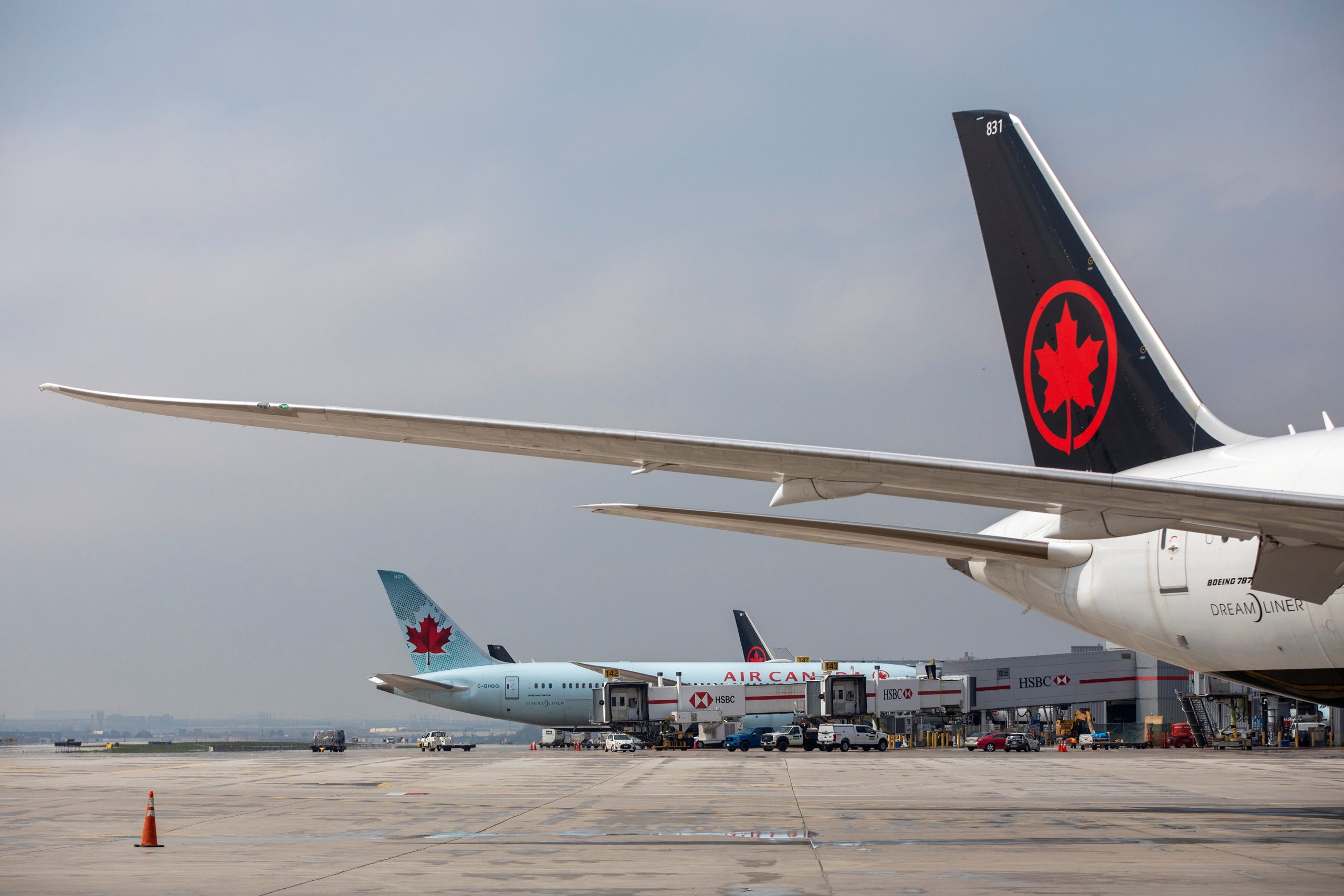Article content
Here is a roundup of stories from The Canadian Press designed to bring you up to speed on what you need to know today…
Liberals to sell budget as boon to fairness


|
|
Air Canada said on Friday it would not need further financial support from the Canadian government, citing the airline’s recovery from the COVID-19 pandemic and an improved financial position.
The country’s No. 1 carrier earlier this month posted a quarterly revenue beat, aided by Canada’s decision to open its borders to fully-vaccinated travelers.
The improving results amid a rise in air travel and debt restructuring that generated cash of about C$7.1 billion ($5.63 billion) in the third quarter prompted Air Canada to exit the government’s aid package, the carrier said.
“Air Canada’s recovery from COVID-19 continues. We are recalling employees, adding new routes and frequencies to our network, and restoring services,” Chief Executive Officer Michael Rousseau said in a statement.
The Canadian government announced in April a support package that provided the carrier access to interest bearing loans of C$5.38 billion ($4.25 billion), as the country’s restrictions to curb the spread of the virus battered travel.
Air Canada said about C$3.98 billion worth of loans from the facility were “never accessed and remain unused.”
ATB Capital Markets analyst Chris Murray said the announcement is in line with recent management commentary on demand, along with advanced booking curves, adding that the government package was a last resort for the carrier.
“It’s another sign of confidence that the company has,” he said.
The government also purchased a 6% stake in Air Canada worth C$500 million and continues to hold those shares, the carrier said.
A representative for Canada’s Finance Minister Chrystia Freeland was not immediately available for comment.
Air Canada stock was down almost 2% in morning trade.
($1 = 1.2647 Canadian dollars)
(Reporting by Abhijith Ganapavaram in Bengaluru; Editing by Anil D’Silva and Shailesh Kuber)
A photo of green onions being sold with the roots chopped off at a Toronto Loblaws store is stirring more anger online against the grocery giant.
The photo posted to the Reddit forum Loblaws Is Out Of Control shows bundles of green onions without the roots at the bottom being sold for $1.79 per bunch.
Many in the comments pointed out that cutting the roots off of a green onion impacts how it tastes, as well as how long it stays fresh.
“I wouldn’t buy those, Glittering_Search_41 wrote. “If you cut off the ends they aren’t retaining their flavour.”
“They will also not keep very long with the root removed,” Mralisterh wrote. “Quartered the shelf life of them, you can already see oxidation. They’re going to rot within days.”
Others speculated that the product could have been chopped by the supplier, or by a new employee in the produce department.
The person who posted the photo said it was the second time they’d seen onions being sold with the roots cut off at the Loblaws located along Toronto’s Lakeshore.
“I believe this is more of a concerted effort to not allow us to regrow our purchased produce and to extract maximum profit,” Party_Setting7622 wrote.
A similar photo of rootless green onions being sold has been posted to the forum before, where one user wondered: “Is that to stop us from regrowing them at home?”
If you cut off the ends they aren’t retaining their flavour.
Loblaw did not respond to a request from comment from Yahoo Canada.
During the first lockdown of the COVID-19 pandemic, green onion became a trendy vegetable to showcase on social media, thanks to how easily they can sprout by putting the roots in a glass of water.
Arlene Hazzan Green, co-founder of the Backyard Urban Farm Company in Toronto, says there are many other vegetables that can be grown at home like a house plant, and without a plot or garden.
“All you need is a pot with holes, some potting mix, a saucer, a watering can, some sun and seedlings,” she says.
Hazzan Green explains there’s two types of plants — cold hardy plants, which can grow in cooler temperatures, and heat loving plants, which need frequent and direct light.
Leafy vegetables like kale, arugula, lettuce, chard and mustard greens and herbs, like basil and mint, fall into the first category and can be grown simply in a flowerpot on a window sill or balcony this time of year.
“You don’t need to wait until May 2-4 weekend, which is what everyone thinks,” she says. “I’ve got seedlings that I got started indoors and now I’m planting them outside.”
Tomatoes can also grow easily in a pot, though they fall under the heat loving plant category and need to grow outside and receive lots of sun.
“They’re great on a balcony,” Hazzan Green says. “And they’re way more tasty when you grow your own.”
When it comes to planting green onions, urban farmer Derek Barber of Homestead Toronto says they can be grown from seed, which is generally done in soil. You can also take the ends of another green onion, which would otherwise go to waste, and place them in water to sprout indoors. An entirely new onion won’t grow but you’ll get the leaves. This trick can be done a few times.
“It’s a great way to reuse vegetable scraps and it’s nice to have an ongoing supply of green onion leaves indoors,” says Barber. “The bottom does slowly decompose so you need to cut the new onions higher up the stem to avoid the soft part and you need to change the water regularly.”
Barber says this sprouting trick can also be done with celery, carrots and radish. Though you’re not getting a complete vegetable from it, the sprouts will produce leaves that make a great garnish and can add some fresh flavour to your meals.
Nine people have been arrested in connection with the gold heist at Pearson International Airport last year, Peel Regional Police said Wednesday.
The arrests were announced at a news conference on the one-year anniversary of the heist.
Police said the suspects face a combined 19 charges and Canada-wide warrants have been issued for the arrest of three other suspects.
During a news conference on Wednesday morning, police said 6,600 gold bars were stolen from Air Canada’s cargo facility on the evening of April 17, 2023 by a suspect who arrived to the warehouse in a five-tonne truck.
The gold, along with about $2.5 million in foreign currency, had been shipped to Toronto from Zurich in the hull of an Air Canada plane and was offloaded to an Air Canada cargo facility shortly after landing at Pearson Airport that afternoon.


Police allege that the suspect came into possession of the stolen gold and bank notes after presenting Air Canada personnel with a fraudulent airway bill.
“The airway bill was for a legitimate shipment of seafood that was picked up the day before,” Det.-Sgt. Mike Mavity, the major case manager for the joint investigation, dubbed Project 24K, told reporters on Wednesday.
“This duplicate airway bill was printed off from a printer within Air Canada cargo.”
Mavity said a forklift arrived a short time later and loaded the stolen gold and currency into the back of the truck. The suspect then drove off with the gold bars, which were estimated to be worth about $20 million.
Brinks Canada, which was hired to provide security and logistics services for the transportation of the shipment, showed up at the facility a few hours later to pick up the items.
Police said Air Canada employees tried to locate the container, realized it was missing, and quickly launched in an internal investigation. Police were notified about the stolen goods shortly before 3 a.m. the following day, Mavity said.
This is a breaking news update. More information to come…


Here is a roundup of stories from The Canadian Press designed to bring you up to speed on what you need to know today…
Liberals to sell budget as boon to fairness
Article content
It’s now up to the federal Liberal government to sell a spending plan it says will help younger Canadians catch up to their elders.
So far, if unsurprisingly, their critics and political rivals are unimpressed.
Advertisement 2
Article content
The $535-billion budget seeks to restore economic fairness for millennials and gen-Z voters at a time when the minority government is ailing in the polls.
It includes $8.5 billion over five years to help build millions of homes and another $2.6 billion for student aid and grant programs.
And it commits funding to the first phase of national pharmacare and promises federal standards for long-term care — two commitments the Liberals made to the NDP.
But New Democrat Leader Jagmeet Singh isn’t in a hurry to say if his party will vote to support the budget and keep the minority Liberals in power.
Federal budget announces measures for open banking
The federal budget announced several measures affecting the banking sector, including long-promised details about a framework for open banking.
Open banking is a system that would allow consumers to easily access their financial data across multiple institutions, apps and services.
The specifics will come with legislation to be tabled before the end of the year, but the federal budget sets out six core elements for the framework.
Advertisement 3
Article content
It also names the Financial Consumer Agency of Canada to oversee and enforce the system.
The budget earmarks $4.1 million over three years for the Finance Department to complete the policy work necessary to establish and maintain the oversight entity and framework.
Trio found guilty in Coutts, Alta., blockade
Three men accused by the Crown of helping lead and coordinate the COVID-19 protest blockade at Coutts, Alta., in 2022 have been found guilty of mischief.
Jurors deliberated for three hours Tuesday night before finding Alex Van Herk, Marco Van Huigenbos, and Gerhard (George) Janzen guilty of one count each of mischief over $5,000.
Gasps of surprise were heard in a courtroom packed with supporters of the trio when the verdict was announced.
The trio were on trial in Court of King’s Bench for their roles in a blockade that tied up cross-border traffic between Canada and the United States at Coutts for two weeks in early 2022 in protest of COVID-19 rules and restrictions.
Van Herk said he’s proud of participating in Coutts and holding politicians accountable.
“If that’s what it takes, that we can show politicians what is right, and we’ll do whatever sentence that is. I’d do it again tomorrow.”
Advertisement 4
Article content
The maximum sentence for public mischief over $5000 is 10 years in prison.
Police to announce arrests in Pearson gold heist
Police are set to announce arrests in a heist of nearly $24 million in gold and cash from Toronto’s Pearson airport last year.
Peel Regional Police are expected to reveal details this morning of their joint task force investigation — dubbed Project 24K — with the U.S. Alcohol, Tobacco and Firearms Bureau.
The news comes on the one-year anniversary of the daring heist.
A lawsuit filed against Air Canada by American security company Brink’s alleged that a thief presented a forged document to collect about $23.8 million in goods from a holding facility at Pearson airport.
Brink’s statement of claim alleged that Air Canada staff handed over 400 kilograms of gold, worth more than $20 million, plus nearly US$2 million in cash to the thief.
Closing arguments expected today in Zameer trial
Prosecutors and defence lawyers are expected to make their final submissions today in the trial of a man accused of running over a Toronto police officer.
Umar Zameer has pleaded not guilty to first-degree murder in the death of Det. Const. Jeffrey Northrup died on July 2, 2021, after he was hit by a vehicle in an underground parking garage at Toronto City Hall.
Advertisement 5
Article content
Zameer has testified he didn’t know Northrup and his partner _ who were in plain clothes — were police officers and he got scared when two strangers rushed towards his car in the largely empty parking lot shortly after midnight.
He told the court he was trying to drive away quickly to save his family from what he believed to be robbers and he didn’t see anything in front of his car or realize he had hit anyone until after his arrest.
Auston Matthews has one more shot at 70 goals
Auston Matthews has one more chance to reach a milestone not touched in nearly three decades.
The Maple Leafs sniper was unable to score in Tuesday night’s 5-2 loss to the Florida Panthers, leaving him stuck on 69 goals for the season.
Matthews and Toronto visit the Tampa Bay Lightning to close out the regular season on Wednesday night. The 26-year-old centre is looking to become the first player to score 70 goals in a campaign since Teemu Selanne and Alexander Mogilny both registered 76 back in 1992-93.
Matthews, who had found the back of the net 10 times in his previous eight games before the loss to the Panthers, can become just the ninth player in NHL history to score 70 goals in a season, joining the likes of Wayne Gretzky, Brett Hull and Mario Lemieux.
Toronto’s defeat to Florida, coupled with Ottawa’s 3-1 victory over Boston, means the Leafs will play the Bruins in the first round of the playoffs. The Panthers and Lightning are set to square off in the other Atlantic Division matchup.
—
This report by The Canadian Press was first published April 17, 2024
Article content




Team Canada’s Olympics looks designed by Lululemon




Political interference in Canada’s pension funds is wrong
Firefighters battle wildfire near Edson, Alta., after natural gas line rupture – CBC.ca




‘BOTTCHER BOMBSHELL:’ Alberta curling foursome set to move forward without skip
Freeland tables her fourth federal budget — this time with a tight focus on housing
Richard Chevolleau Short Film “Marvelous Marvin” Set to go to Camera




Stephen Poloz will lead push to boost domestic investment by Canadian pension funds
$535B budget projects $39.8B deficit, aims to restore economic fairness
Comments